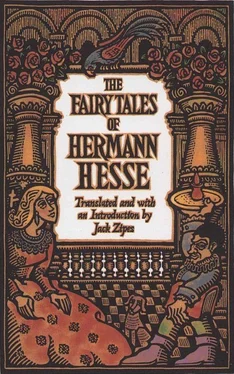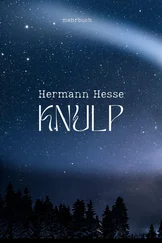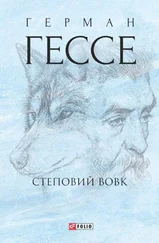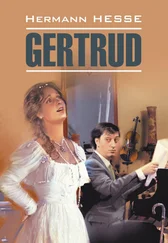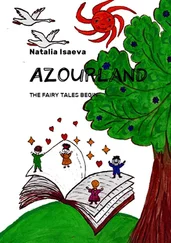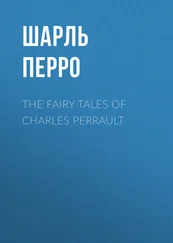Hermann Hesse - The Fairy Tales of Hermann Hesse
Здесь есть возможность читать онлайн «Hermann Hesse - The Fairy Tales of Hermann Hesse» весь текст электронной книги совершенно бесплатно (целиком полную версию без сокращений). В некоторых случаях можно слушать аудио, скачать через торрент в формате fb2 и присутствует краткое содержание. Год выпуска: 1995, ISBN: 1995, Издательство: Bantam Books, Жанр: Классическая проза, Сказка, на английском языке. Описание произведения, (предисловие) а так же отзывы посетителей доступны на портале библиотеки ЛибКат.
- Название:The Fairy Tales of Hermann Hesse
- Автор:
- Издательство:Bantam Books
- Жанр:
- Год:1995
- ISBN:9780553377767
- Рейтинг книги:5 / 5. Голосов: 1
-
Избранное:Добавить в избранное
- Отзывы:
-
Ваша оценка:
- 100
- 1
- 2
- 3
- 4
- 5
The Fairy Tales of Hermann Hesse: краткое содержание, описание и аннотация
Предлагаем к чтению аннотацию, описание, краткое содержание или предисловие (зависит от того, что написал сам автор книги «The Fairy Tales of Hermann Hesse»). Если вы не нашли необходимую информацию о книге — напишите в комментариях, мы постараемся отыскать её.
The Fairy Tales of Hermann Hesse — читать онлайн бесплатно полную книгу (весь текст) целиком
Ниже представлен текст книги, разбитый по страницам. Система сохранения места последней прочитанной страницы, позволяет с удобством читать онлайн бесплатно книгу «The Fairy Tales of Hermann Hesse», без необходимости каждый раз заново искать на чём Вы остановились. Поставьте закладку, и сможете в любой момент перейти на страницу, на которой закончили чтение.
Интервал:
Закладка:
Sometimes when he despairingly tossed his search to the winds and gave up in a terrible mood, he would unexpectedly be stirred by something like a breath of air from distant gardens. He would whisper the name Iris to himself, ten times and more, softly and playfully, like one testing a note on a taut string. “Iris,” he whispered, “Iris,” and he felt something move within him with a slight pain, as in an old abandoned house when a door opens and a shutter slams without cause. He examined memories that he thought he had ordered neatly within himself, and he made strange and disturbing discoveries in the process. His treasure of memories was infinitely smaller than he had imagined. Entire years were missing and stood empty, and when he tried to recall them, they were like blank pages. He found that he had great difficulty conceiving a clear picture of his mother once again. He had completely forgotten the name of a girl whom he had ardently pursued for one year during his youth. He recalled a dog that he had once bought on an impulse during his student years and that he had kept for some time. It took him some days before he could remember the name of the dog.
With growing sorrow and fear, the poor man painfully saw how wasted and empty the life that lay behind him had become. It no longer belonged to him but was strange and disconnected, like something once memorized that could be recalled only with difficulty in the form of barren fragments. He began to write. He wanted to write down, year by year, his most important experiences in order to get a firm hold on them again. But what were his most important experiences? Becoming a professor? Receiving his doctorate? His high school or university days? Forming short attachments and liking different girls in forgotten times? Terrified, he looked up. Was that life? Was that all? He slapped his forehead and could not stop himself from laughing compulsively.
Meanwhile time flew. It had never flown by so quickly and relentlessly! A year was gone, and it seemed to him that he was in exactly the same position that he had been when he left Iris. However, he had changed a great deal during this time, something that everyone saw and knew except him. He had become both older and younger. He had become practically a stranger to his acquaintances, who regarded him now as absentminded, moody, and odd. He gained the reputation of a strange eccentric, and people said it was a shame about him, but he had remained a bachelor too long. Sometimes he forgot his responsibilities at the university, and his students waited for him in vain. Sometimes, steeped in thought, he would meander down a street and walk by houses, brushing the dust from the ledges with his tattered coat as he passed. Many thought he had taken to drink. Other times he would stop right in the middle of a lecture in front of his students and try to remember something. Then his face would break into a childlike smile that was very soft and unusual for him, and he would continue his lecture in a warm and moving tone that stirred the hearts of many of his students.
After years of searching hopelessly for the fragrances and scattered traces of his remote past, Anselm had developed a new sensitivity that he himself could not recognize. It seemed to him more and more frequently that behind what he had previously called memories were even more memories, like an old painted wall where sometimes even older pictures lie concealed behind the old ones that have been painted over. He wanted to recall something like the name of a city where he had once spent some days as a traveler, or the birthday of a friend, or anything at all, and as he now dug up and rummaged through a small piece of the past as though it were debris, something entirely different occurred to him in a flash. A breeze surprised him like an April morning wind or like a misty day in September. He smelled a fragrance. He tasted a flavor. He felt dark tender sensations here and there on his skin, in his eyes, in his heart, and gradually it became clear to him: There must have been a day one time, blue and warm, or cool and gray, or some kind of day, and the essence of this day must have been caught within him and clung there as a dark memory. He could not determine exactly the spring or winter day that he distinctly smelled and felt in the real past. He could not name or date it. Perhaps it had been during his student days. Perhaps he had still been in the cradle, but the fragrance was there, and he felt something within him that he did not recognize and could not name or determine. Sometimes it seemed to him as though these memories reached back beyond life into a previous existence, although he smiled at the thought.
Anselm found many things during his helpless wanderings through the caverns of his memory. He found many things that moved and gripped him, and many things that scared him and made him anxious, but he did not find the one thing that signified the name Iris for him.
One time, in the midst of his torment over not being able to find his goal, he went back to visit his old home city, saw the woods and streets, the paths and fences again, stood in the old garden of his childhood, and felt the waves surge over his heart. The past enveloped him like a dream. Sad and silent, he returned to the city and told everyone that he was sick and had all visitors sent away.
However, one visitor insisted on seeing him. It was his friend, whom he had not seen since the day he had asked Iris to become his wife. This man came and saw Anselm sitting in a neglected condition in his dismal apartment.
“Get up,” he said to him, “and come with me. Iris wants to see you.”
Anselm jumped up.
“Iris! What’s wrong with her? Oh, I know, I know!”
“Yes,” said his friend. “Come with me. She’s going to die. She’s been sick a long time.”
They went to see Iris, who lay on a sofa, light and slender like a child, and she smiled cheerfully with magnified eyes. She gave Anselm her soft white child’s hand, which lay like a flower in his, and her face was as though transfigured.
“Anselm,” she said, “are you angry with me? I set a hard task for you, and I see you’ve kept your pledge. Keep searching and keep going until you reach your goal! You thought you were doing it for my sake, but you’ve really been doing it for your own. Do you know that?”
“I suspected it,” Anselm replied, “and now I know. It is a long way, Iris, and I would have turned back some time ago, but I can no longer find my way back. I don’t know what will become of me.”
She peered into his sad eyes and gave him a slight and consoling smile. He bent over her thin hand and wept for a long time, so that her hand became wet from his tears.
“What will become of you?” she said with a voice that was only like a glimmer of memory. “You must not ask what will become of you. You have searched a great deal in your life. You have sought honor and happiness and knowledge, and you’ve sought me, your little Iris. All these things were only pretty images, and they abandoned you as I must leave you, I, too, have experienced this. I always searched, and I kept finding lovely and beautiful pictures, and they kept fading and vanishing. Now I have no more pictures. I’m no longer searching. I’ve returned home and have only one more step to take, and then I’ll be home. You, too, will arrive there, Anselm, and you won’t have any more wrinkles on your forehead.”
She was so pale that Anselm cried out in desperation. “Oh, wait, Iris! Don’t go yet! Give me a sign that I won’t lose you entirely!”
She nodded and reached into a glass next to her bed and gave him a fresh blue iris in full bloom.
“Here, Take my flower, the iris, and don’t forget me. Search for me, search for the iris. Then you’ll come to me.”
Читать дальшеИнтервал:
Закладка:
Похожие книги на «The Fairy Tales of Hermann Hesse»
Представляем Вашему вниманию похожие книги на «The Fairy Tales of Hermann Hesse» списком для выбора. Мы отобрали схожую по названию и смыслу литературу в надежде предоставить читателям больше вариантов отыскать новые, интересные, ещё непрочитанные произведения.
Обсуждение, отзывы о книге «The Fairy Tales of Hermann Hesse» и просто собственные мнения читателей. Оставьте ваши комментарии, напишите, что Вы думаете о произведении, его смысле или главных героях. Укажите что конкретно понравилось, а что нет, и почему Вы так считаете.
